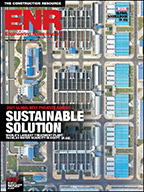Massachusetts and the federal government squared off Nov. 29 at the U.S. Supreme Court over federal regulation of greenhouse gases. In oral arguments at the court in the case, "Massachusetts v. Environmental Protection Agency," both sides faced pointed questions from the justices, generally reflecting the split on the court between conservatives and moderates. A decision is expected before the court ends its term next summer and will provide a clearer picture of the court's views on environmental issues.
The case deals with a 2003 EPA determination that the Clean Air Act didn't give it the authority to regulate vehicles' emissions of carbon dioxide and other greenhouse gases to deal with global climate change. Massachusetts contends that the statute does give EPA that power. Last year, a federal appeals court ruled in EPA's favor, and the state appealed to the Supreme Court.
|
During the first part of the oral arguments, Massachusetts Assistant Attorney General James R. Milkey contended that EPA's decision on the vehicle emissions was "based on plain errors of law reviewable under any standard."
But the justices quickly turned the focus of their questions on the state's standing to bring the case, which included proving how it is harmed by global warming. Associate Justice Antonin Scalia quizzed Milkey about how imminent a harm the state faced, asking when the "expected cataclysm" would occur. Milkey said that "it's not so much a cataclysm as ongoing harm."
As other justices pursued a similar line of questioning, Milkey said the state stands to lose 200 miles of its shoreline as water levels rise from global warming. "The harm is already occurring," Milkey said. "It is ongoing and it will happen well into the future."
He added, "Our harm is imminent in that sense that lighting a fuse on a bomb is imminent harm."
The federal government's attorney, Deputy Solicitor General Gregory G. Garre, faced tough questioning and comments from liberals and moderates on bench. Associate Justice Stephen Breyer raised the hypothetical case of emissions of agent orange, and asked Garre what EPA's views on legal standing for someone facing a 1 in 10,000 risk of getting cancer from those emissions. Garre said that was "a fundamentally different case."
Associate Justice David Souter pressed Garre on what sort of connection the state needs to show between cuts in greenhouse gas emissions and reduced land losses. The issue, he said said that the redressing injuries from greenhouse gases "is a question of more or less, not a question of either-or."
Breyer also said that that it's possible that if the U.S. decides to regulate CO2, it might lead to actions by other countries to combat global warming. Breyer suggested that other governments might require carbon sequestration from powerplants and decide that more ethanol plants are a good idea. And "Lo and behold, Cape Cod is safe."
 Related Links:
Related Links: 

